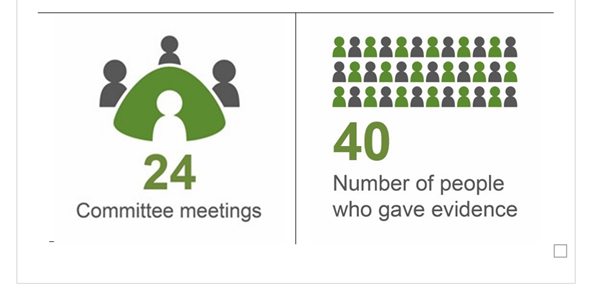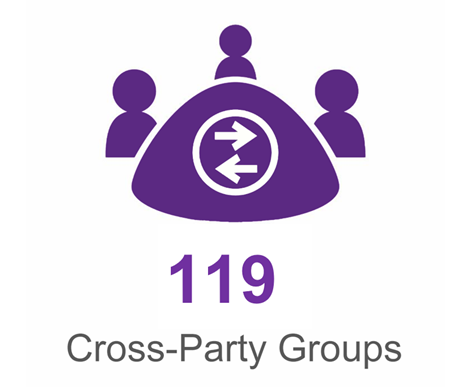Standards, Procedures and Public Appointments Committee
Annual Report of the Standards, Procedures and Public Appointments Committee 2023-24
Introduction
This report covers the work of the Standards, Procedures and Public Appointments Committee during the Parliamentary year between 13 May 2023 and 12 May 2024.
Membership changes
Previous Members of the Committee during the reporting year:
Bob Doris (SNP) (22 June 2021 – 29 June 2023)
Christine Grahame (SNP) (29 June 2023 – 5 September 2023)
Emma Harper (SNP) (18 April 2023 – 29 June 2023)
Stephen Kerr (Con) (29 June 2023 – 28 March 2024)
Ivan McKee (SNP) (29 June 2023 – 6 May 2024)
Edward Mountain (Con) (17 June 2021 – 29 June 2023)
Alexander Stewart (Con) (25 May 2022 – 29 June 2023)
Evelyn Tweed (SNP) (5 September 2023 – 6 March 2024)
Meetings

The Committee met 24 times during the parliamentary year. Five meetings were held entirely in private, 19 meetings included items in private and no meetings were held entirely in public. The purpose of the majority of private items was for the Committee to consider evidence that had been heard, to consider a draft report or to consider its future work programme.
Legislation
Bills
Scottish Elections (Representation and Reform) Bill
The Committee was designated lead committee for scrutiny of the Scottish Elections (Representation and Reform) Bill, which was introduced on 23 January 2024.
The Bill proposes changes to the law affecting Scottish Parliament and Scottish local government elections.
The Committee issued a call for written responses and received 24 responses.
Formal evidence sessions at Stage 1 began on 21 March 2024 and concluded with an evidence session with the Scottish Government on 2 May 2024.
The Committee is due to publish its Stage 1 Report in June.
Subordinate legislation
During the Parliamentary year, the Committee considered one Scottish Statutory Instrument (SSIs) under the negative procedure:
Scottish Local Government Elections Amendment (Denmark) Regulations 2024 (SSI 2024/101)
Inquiries/case studies
Proxy Voting Pilot and permanent rule change
In its last Annual Report, the Committee noted that, following a recommendation of the Committee, the Parliament had agreed a temporary rule to allow for a pilot of proxy voting. The Committee conducted an evaluation of the proxy voting pilot in advance of the pilot's conclusion in December 2023. The evaluation included consideration of data on usage of the pilot scheme, a survey to all members seeking their views on the pilot along with correspondence to the Parliamentary Bureau, all party groups and the Presiding Officer.
The majority of respondents to the Committee’s consultation were supportive of the proxy voting system. The Committee considered that the pilot proxy voting system had been used appropriately and proportionately since its introduction.
Following the evaluation the Committee concluded that it wished to recommend to the Parliament that a permanent rule change to enable proxy voting be introduced.
A permanent Standing Orders rule change to enable proxy voting was agreed by the Parliament and came into effect on 22 December 2023. The new rules allow a member to request a proxy vote where they have serious long-term illness or injury; parental leave; bereavement or are attending to person who appears to be near the end of life. The Standing Orders are supported by a scheme issued by the Presiding Officer which sets out details of how a Member may apply to the Presiding Officer to arrange for their vote to be cast by another member in meetings of the Parliament .
A Parliament for All Report of the Parliament's Gender Sensitive Audit
The Committee has continued its consideration of the recommendations in the report of the Parliament’s Gender Sensitive Audit "A Parliament for All". This included taking evidence from Susan Duffy, the parliamentary official who led on this work, and from Professors Meryl Kenny and Sarah Childs who were expert advisers on the Board overseeing the Gender Sensitive Audit.
One of the recommendations in the Audit was for a permanent proxy voting system to be introduced which, as noted above, was recommended by the Committee and agreed by the Parliament.
Committee effectiveness
The Committee has agreed to hold an inquiry on committee effectiveness. To help inform the remit of the inquiry the Committee took evidence at its meeting on 29 February 2024 from two former Conveners, Johann Lamont and Adam Tomkins. The evidence session explored three broad areas regarding committee structures, balance of work and making space for innovation. It is expected that the committee will agree its remit and hold further evidence sessions in the coming months.
Elected Conveners
The Committee is looking into the possible introduction of a system of elected conveners for committees. To inform its work it has consulted MSPs, the Conveners Group, the Parliamentary Bureau, the SPCB and political parties. It has sought to gather views on how such a system would operate exploring issues relating to the nomination of candidates, the election process and the removal of conveners. The Committee is due to consider responses to its consultation before the summer recess.
Oral questions
The Committee has been considering the current arrangements for oral questions. This has included consulting on whether the current arrangements for question times strike an appropriate balance between questions lodged in advance and those asked with no notice, the deadlines for lodging questions, the opportunities for Members to ask questions in response to emerging issues and the duration, number and frequency of question times. The Committee is expected to consider the consultation findings later in May.
Legislative Consent
The Committee has continued consideration of the Standing Order procedures on consent in relation to UK Parliament Bills. This work followed concerns raised by both the Conveners Group and the Constitution, Europe, External Affairs and Culture Committee who wrote to the Committee to highlight the lack of provision in Standing Orders about motions refusing legislative consent.
The Committee is considering a new rule to allow for motions refusing legislative consent. The new rule proposes a similar rule for motions refusing consent as currently exists for consent motions.
The Committee wrote to all the Scottish Parliament Committees, the Parliamentary Bureau, the political parties represented in the Parliament (at June 2023) and the Minister for Parliamentary Business to seek their views on proposals. It is expected the Committee will report to the Parliament on whether it wishes to propose changes to Standing Orders before the summer recess.
Evidence session Minister for Parliamentary Business
The Committee held an evidence session with the Minister for Parliamentary Business on 23 November 2023 which considered a wide range of matters related to the Committee’s remit and the Minister’s portfolio.
Code of Conduct for MSPs
The Committee has considered potential revisions to the Code of Conduct for MSPs. Once these revisions have been consulted on the Committee will then report to the Parliament with any recommended changes to the Code of Conduct.
Complaints
The Committee has been considering a report from the Scottish Parliamentary Corporate Body.
The Committee has not considered any complaint reports from the Commissioner for Ethical Standards in Public Life in Scotland (the Commissioner) in this parliamentary year.
Post legislative scrutiny
Lobbying (Scotland) Act 2016
The Committee considered an evaluation of the Lobbying (Scotland) Act 2016 carried out by the Scottish Parliament Information Centre. The Committee has agreed to consider further whether it wishes to pursuing any changes to the Act.
Parliamentary Corporation Supported Bodies
Under the Parliament’s Standing Orders, the annual reports or strategic plans of supported bodies are to be referred to the Committee within whose remit the subject matter of that document falls for consideration.
The Committee took evidence from the Ian Bruce, Commissioner for Ethical Standards in Public Life in Scotland on his annual report on 14 March 2024.
The Committee took evidence from David Hamilton, the new Scottish Information Commissioner on his annual report on 22 February 2024.
The Electoral Commission is a UK-wide body that has, since 2021, been formally accountable to and funded by the SPCB in relation to its functions in relation to devolved Scottish elections and referendums. Matters relating to elections fall within the remit of the Committee and the Committee took evidence from Dame Susan Bruce, Electoral Commissioner for Scotland, on the Commission's annual report on 9 November 2023.
The Convener has been invited to provide evidence on behalf of the Committee to the Finance and Public Administration Committee as part of its inquiry on Scotland's Commissioner Landscape to consider whether a more coherent and strategic approach to the creation and development of Commissioners in Scotland is required.
Petition consideration
The Committee has one petition it is currently considering:
Petition PE1949: Review the rules concerning dual mandate MSPs (first introduced on 12 July 2022) is a petition by Alexander James Dickson calling on the Scottish Parliament to urge the Scottish Government to review the rules regarding ‘Dual Mandate MSPs’, who whilst holding a seat in the Scottish Parliament also have a role in another local or national level of government and legislate to bring them in line with the Senedd and Stormont by preventing MSPs from holding a dual mandate, in time for the next Scottish Parliament elections.
The Committee considered this petition at its meetings on 1 June 2023 and 21 September 2023 and agreed to keep it open pending further evidence as part of the Scottish Elections (Representation and Reform) Bill. The Committee has taken the opportunity to seek views on this issue in the course of its scrutiny of the Bill.
Equal opportunities
The Committee placed equalities as a key aspect of its consideration of a permanent proxy voting scheme. The Committee believes that proxy voting is an important component of ensuring the Parliament is inclusive and accessible. The permanent scheme has retained parental leave as a circumstance in which a member can request a proxy vote. The Committee placed the eligibility criteria (which includes parental leave) in Standing Orders to ensure they were given a permanent status.
The Committee's ongoing consideration of the Gender Sensitive Parliament Audit has ensured that the Committee takes cognisance of gender issues in its approach to the current work it is conducting on committee effectiveness. The committee recognises that adopting a gender sensitive approach is a key component of ensuring good scrutiny.
Cross-Party Groups

A total of 119 Cross-Party Groups (CPGs) have either been accorded recognition by the Committee in this parliamentary session or re-registered on the basis that they had been recognised in a previous parliamentary session.
Two new CPGs were accorded recognition this year and one cross-party group voluntarily wound up owing to lack to available time to commit to this CPG.
The Committee received three complaints in relation to the operation of CPGs. Two complaints were in relation to the CPG on Drug and Alcohol Misuse, of which one complaint was upheld. Further detail of this complaint can be found here.
The third complaint in relation to another CPG is currently under consideration.